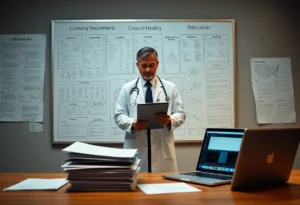It’s crucial to find the right moving services that cater specifically to your unique needs as a medical professional. Relocating can be a daunting task, especially when you have a demanding schedule and responsibilities that come with your profession. This blog post will provide you with insights into the specialized moving services available for medical staff, helping you streamline your relocation process while ensuring a smooth transition to your new workplace and community.
The Unique Demands of Medical Relocation
Relocating as a medical professional often comes with specific demands that set it apart from other relocations. Your job requires not only a seamless transition in living arrangements but also a quick acclimatization to a new environment, so that you can continue to provide necessary care to your patients. Given the unpredictable hours and responsibilities you face, the logistical aspects of moving—such as timing, housing, and community integration—become even more critical in ensuring a stress-free move.
Understanding the Lifestyle of Healthcare Workers
Your lifestyle as a healthcare worker is inherently demanding and time-sensitive. Long shifts, on-call responsibilities, and a fast-paced work environment mean that your personal time for planning a relocation is often limited. Balancing the needs of your profession with the logistics of moving can be overwhelming, making it vital to utilize supportive services tailored to your unique situation.
Key Challenges Faced During Relocation
Relocating as a medical professional presents distinct challenges that can complicate your move. Juggling tight schedules with urgent relocation timelines creates pressure, while finding suitable housing nearby your new workplace adds an extra layer of difficulty. Additionally, you may need to consider access to community services, schools, and amenities that cater specifically to your needs and those of your family.
Finding the right neighborhood can be particularly challenging; you might prioritize proximity to your new workplace while also considering factors like safety and local amenities. Schools, childcare options, and recreational facilities become necessary elements of your search if you have a family. Furthermore, last-minute staffing changes and new job assignments can shift your plans dramatically, often requiring you to delay or expedite your move, adding to the tension and unpredictability of the situation. Partnering with specialized moving services can help mitigate these challenges by providing tailored solutions that understand your world.
Tailored Moving Solutions for Medical Professionals
For medical professionals, relocation requires moving solutions finely tuned to their unique needs. Specialized services recognize the tight timelines often associated with job offers and hospital placements, ensuring that your move is efficient and seamless. Whether you’re relocating to a bustling city for a new residency or transferring to a different clinic, tailored moving solutions focus on minimizing disruption to your busy schedule while providing a hassle-free experience.
Specialized Packing and Transport Requirements
Medical equipment and personal belongings come with unique packing and transport needs. Specialized moving services understand this and offer custom packaging solutions that safeguard sensitive items, from fragile medical instruments to vital documents. Using high-quality materials, movers can ensure that your belongings arrive safely and in perfect condition, ready to support your professional duties.
Streamlining the Transition with Customized Services
Customized services for medical professionals not only simplify the relocation process but also provide vital support tailored to your individual circumstances. For example, you might benefit from scheduled moving dates aligned with your start date, so there’s no overlap with your professional responsibilities. Additionally, some services even offer temporary storage solutions, providing peace of mind if your new housing isn’t immediately available upon arrival. You’ll find that every aspect of your move can be managed, leaving you to focus on what matters most—your career in healthcare.
Streamlining your transition goes beyond just logistics. Consider personalized consultations that assess your specific needs—perhaps you’re moving with family, or you have specialized items requiring extra attention. Some providers even offer destination services, from help with finding schools for your children to identifying local healthcare resources. By combining these comprehensive offerings, your transition can feel less like a daunting task and more like a step toward an exciting new chapter in your medical career.
Insider Tips for a Smooth Move
Your move doesn’t have to be stressful. Follow these insider tips to ensure a seamless transition:
- Plan early and create a detailed timeline.
- Communicate with your employer about relocation benefits.
- Research your new area to find necessary services and amenities.
- Label boxes clearly to make unpacking easier.
- Enlist the help of professional movers with healthcare experience.
This will enhance your moving experience and minimize disruptions to your busy schedule as a medical professional.
Essential Checklists for Medical Staff
Utilizing a checklist tailored for your relocation can save you time and energy. Prioritize tasks such as gathering important medical records, scheduling utility transfers, and updating your professional licenses. Your checklist should also include reminders for notifying your new employer about your moving date and any specific accommodations you may need during the transition. Having a detailed list not only keeps you organized but also ensures nothing slips through the cracks.
Timing Considerations for Relocation
The timing of your relocation significantly impacts your overall experience. Consider factors such as peak relocation seasons, typically from mid-spring to early fall, which can heighten demand for moving services. Additionally, aligning your move with your work schedule can help ease the transition. Aim to move during your off-peak hours or between shifts to minimize disruption to your professional obligations. By planning your move strategically, you can better manage your workload and personal commitments.
Taking into account your workplace’s busy periods can also enhance your relocation planning. Many healthcare facilities have high-demand seasons such as flu season or major health events, which may limit your availability. If possible, schedule your relocation during quieter months when service demand is low, ensuring smoother logistics. Moreover, this careful timing allows you to acclimate to your new location without the additional stress of a packed work schedule, enabling a more efficient adjustment to your new role.
Navigating Emotional and Psychological Impact
Relocating can evoke a whirlwind of emotions for medical staff, from excitement to anxiety. You’re entering a new phase of your career, which may entail leaving behind familiar environments and support systems. Understanding these feelings is the first step in navigating them effectively. Many healthcare professionals experience a mix of anticipation and stress as they adapt to new roles and communities. Recognizing the emotional landscape allows you to better manage, embrace change, and ultimately thrive in your new setting.
Building Resilience During Change
Embracing resilience helps in adjusting to a relocation. You can cultivate a positive mindset by focusing on the opportunities ahead and setting realistic expectations. Engaging in healthy coping mechanisms, such as regular exercise or mindfulness practices, supports both emotional well-being and professional success. Finding moments of joy amidst challenges fosters a sense of stability and adaptability, enabling you to face your transition with confidence.
Resources for Support and Community Building
Connecting with others during a relocation is vital for emotional stability. Look for local support groups, both online and in-person, that cater specifically to healthcare professionals. Many cities have associations or clubs for medical staff, providing an avenue to share experiences and build networks. Engaging with these communities not only helps combat feelings of isolation but also enriches your social life and professional connections.
In many regions, organizations and platforms like Facebook groups or Meetups offer tailored networks for medical workers. These groups often include resources like mentorship programs, career advice, and social events designed for newcomers. By participating, you can share insights, ask questions, and find valuable support from those who’ve navigated similar transitions. This sense of community fosters relationships that can ease your adjustment and enhance both personal and professional fulfillment during your relocation journey.

The Role of Technology in Modern Moves
Modern relocations are increasingly enhanced by technology, providing efficiencies that streamline the moving process for medical staff. From digital inventory systems to real-time tracking apps, tech innovations simplify logistics, ensuring you stay informed and organized. Embracing these tools not only reduces the stress associated with moving but also allows you to focus more on your transition to your new role rather than the complexities of relocation.
Digital Tools for Tracking and Management
With the advent of specialized moving apps, tracking your belongings has never been easier. These platforms often feature inventory management, allowing you to catalog items and monitor them throughout the moving process. This eliminates uncertainty and helps you understand where your belongings are at any moment, offering peace of mind as you transition into your new environment.
Virtual Consultations and Assistance
Virtual consultations provide invaluable support when relocating, connecting you with experts who can guide you through the moving process. From initial planning stages to unpacking at your new destination, these consultations create tailored solutions specific to your needs, making the journey smoother and more efficient.
Utilizing virtual consultations allows for immediate access to relocation experts who understand the demands of your profession. Instead of scheduling in-person meetings, you can receive advice, tips, and resources from your current location. This adaptability ensures you can engage with moving specialists at a time that suits your schedule, making it easier to address concerns like finding appropriate housing or understanding local healthcare facilities. With tools like video conferencing, you can discuss logistics face-to-face, creating a personalized experience while easing anxieties related to your move.
To wrap up
To wrap up, navigating the relocation journey as a medical professional requires tailored moving services that cater to your unique needs. By partnering with specialists who understand the demands of your profession, you can ease the transition for you and your family. Prioritizing your preferences and providing comprehensive support, these services can help you focus on what truly matters—excelling in your medical career while settling into your new environment. Take the time to assess options that align with your requirements for a smooth and successful move.




